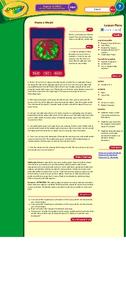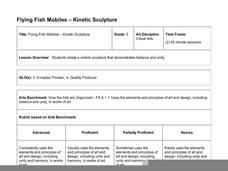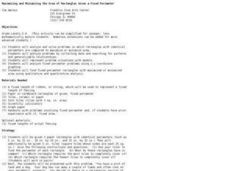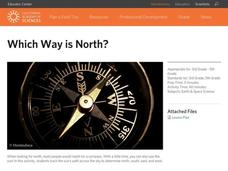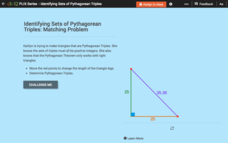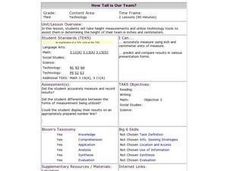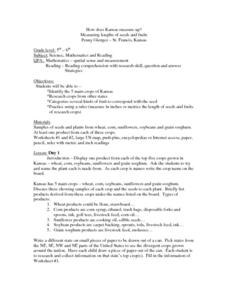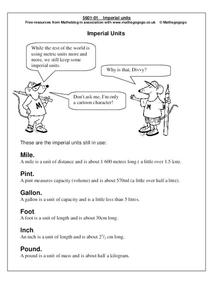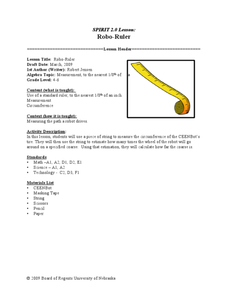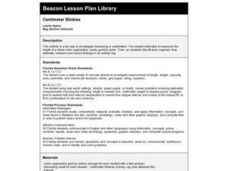Creative Educator
Dream Room Design
Junior designers brainstorm the elements that a bedroom might have, such as a bed, television, and dresser. They identify which items are needs and which are desires. They practice measurement skills in the classroom by determining its...
Illustrative Mathematics
Converting Fractions of a Unit into a Smaller Unit
There is more than one way to answer a question; especially when you have fractions in measurement. Here are three questions with real-world situations in which 5th graders are asked to provide answers in three ways: a larger unit of...
Curated OER
Weave a Wreath
Students follow directions to complete a multi-step process that results in an attractive holiday decoration. In this Christmas art activity lesson, students employ simple measuring and weaving techniques and experiment with the negative...
Hawaiʻi State Department of Education
Flying Fish Mobiles – Kinetic Sculpture
Budding artists experiment with balance and movement as they learn about Alex Calder and his kinetic sculptures. They'll view several of Calder's pieces and review biographical information, then they'll work through the artistic process...
Curated OER
Maximizing and Minimizing the Area of Rectangles Given a Fixed Perimeter
Students explore the realms of measurement. In this math lesson plan, students analyze and solve problems in which rectangles with identical perimeters are compared to maximize or minimize area. This lesson can be extended for algebra,...
Exploratorium
Marshmallow Puff Tube
Let physical science stars experience Newton's first law of motion by blowing marshmallows out of cardboard tubes! Using different lengths of tubing, they find that more force is needed to overcome increasing friction, and they have a...
Virginia Department of Education
Out of the Box
There's no need to think outside the box for this one! Scholars measure the length, width, and height of various boxes. Results help develop the formulas for the surface area and volume of rectangular prisms.
Civil War Trust
Map the Civil War
Mapmaking was a very important element in successfully planning attacks on enemies during the Civil War. Guide pupils through the process of pacing to find the average length of their steps, measure the distance between one object...
California Academy of Science
Which Way is North?
Who needs a compass to find cardinal directions? Just place a stick in the ground and record the movement of its shadow over the course of a day. Then, measure the shadow lengths in order to determine a north-south line. A simple...
CK-12 Foundation
Identifying Sets of Pythagorean Triples: Matching Problem
What sets of whole numbers make up the measures of side lengths in right triangles? Pupils use an interactive triangle to learn about Pythagorean triples. Individuals find missing values in triples and learn more about Pythagorean...
DiscoverE
Make a Light Bulb
Could you reinvent the light bulb? Scholars tap into their inner Thomas Edisons to build a light bulb prototype out of a jar and some wires. They see how long the filament wire glows in the jar (batteries not included) to measure their...
Curated OER
Black Bayou Lake Measures Up
Learners, in groups, estimate measurments and then select the tools needed and measure various items at Black Bayou Lake refuge.
Curated OER
Candy Bar Math Fun!
Students practice math. In this measurement lesson, students measure their favorite candy bars to the nearest inch. They work independently to compare the different lengths of the candy bars they measure.
Curated OER
Math Lesson Plan
First graders are introduced to how to use a ruler and its purpose. Using a boomerang, they estimate its length and then measure it using a string and ruler. In groups, they practice the same exercise with various objects while...
Curated OER
Math/Technology: Height Measurement
Third graders, using technology tools, determine the total height of their classmates in both inches and centimeters. Once the measurements are taken, they enter the results in the Excel file. Once students have prepared a KidPix number...
Curated OER
How Does Kansas Measure Up?
Students identify the five main crops of Kansas and crops that are produced in other states. The categorize the types of fruits and seeds of each plant and measure each to compare the length of each.
Curated OER
Metric Conversions Worksheet
In this metric instructional activity, students examine conversion factors for length, mass, volume and area. Definitions of prefixes and metric abbreviations are identified.
Curated OER
Imperial Units
In this imperial units worksheet, students read the definitions to the following list of imperial units: mile, pint, gallon, foot, inch and pound.
Curated OER
How Many?
In this measurement worksheet, students complete a 12 question multiple choice online interactive assessment about standard modern and ancient measurement.
Curated OER
Robo Ruler
Students calculate measurements using different units and fractions. In this algebra lesson, students measure the path that a robot drives. They use a piece of sting to do their measurement and calculate the circumference of the robot's...
Curated OER
How to Figure Board Feet and Cost of a Board
Students investigate woodworking and converting lengths to cubic measurements. In this math conversions instructional activity, students examine the length of a piece of board, and its total area by using the formula for finding...
Curated OER
Centimeter Slinkies
Third graders estimate and measure the length of a whole color-segmented, candy gummy worm. Then, as students bite off each segment, they estimate, measure and record findings in an activity log.
Curated OER
"Where Does Pi Come From?"
Fifth graders explore geometry by exploring Pi. In this circle measurement lesson plan, 5th graders identify the relationship between the radius, diameter and circumference of a circle and how Pi is the key to unlocking any circular...
Curated OER
Conversion Math
In this conversion activity, students find the corresponding length or weight for each measurement given using the conversion chart given. Students complete 4 problems.




